The Plextor M3 (256GB) Review
by Kristian Vättö on April 5, 2012 3:05 AM ESTRandom and Sequential Read/Write Speed
The four corners of SSD performance are as follows: random read, random write, sequential read and sequential write speed. Random accesses are generally small in size, while sequential accesses tend to be larger and thus we have the four Iometer tests we use in all of our reviews. Our first test writes 4KB in a completely random pattern over an 8GB space of the drive to simulate the sort of random access that you'd see on an OS drive (even this is more stressful than a normal desktop user would see). We perform three concurrent IOs and run the test for 3 minutes. The results reported are in average MB/s over the entire time. We use both standard pseudo randomly generated data for each write as well as fully random data to show you both the maximum and minimum performance offered by SandForce based drives in these tests. The average performance of SF drives will likely be somewhere in between the two values for each drive you see in the graphs. For an understanding of why this matters, read our original SandForce article.
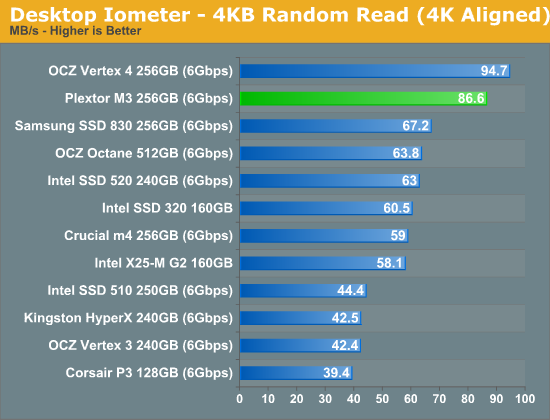
Plextor M3 provides very good 4KB random read performance. Looking at the Crucial m4 that uses the same Marvell controller, the Plextor M3 is 47% faster in random performance, so Plextor has clearly paid attention to their firmware.
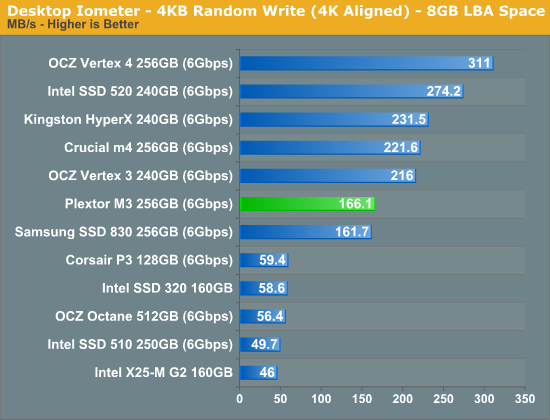
Random write performance is not as great as random read but still quite good enough for most workloads. This time Crucial's m4 comes out 33% faster than the M3, while the SF-2281 drives are all faster as well—write less data thanks to realtime compression and data deduplication techniques and your write speeds should generally be faster.
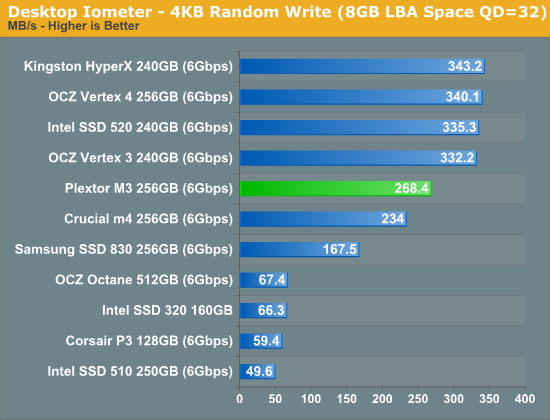
Switching the queue depth to 32 shows the difference between SandForce and non-SandForce quite well. SandForce is in its own class but among the Marvell SSDs, the Plextor M3 is the fastest. It's important to note that only heavy I/O workloads use queue depths that reach 32; most usage models don't go over 5.
Sequential Read/Write Speed
To measure sequential performance we ran a one minute long 128KB sequential test over the entire span of the drive at a queue depth of 1. The results reported are in average MB/s over the entire test length.
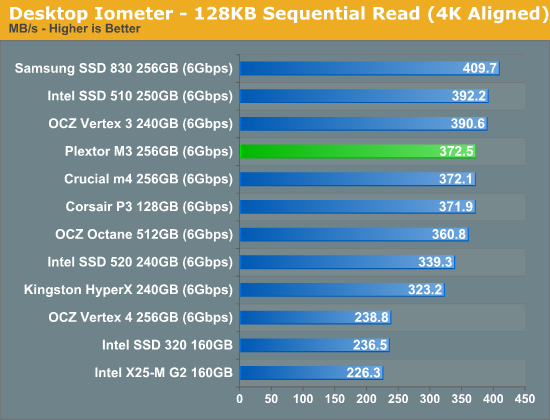
Sequential read speed is identical to Crucial m4 and Corsair P3, and good if not class leading for a SATA 6Gbps SSD.
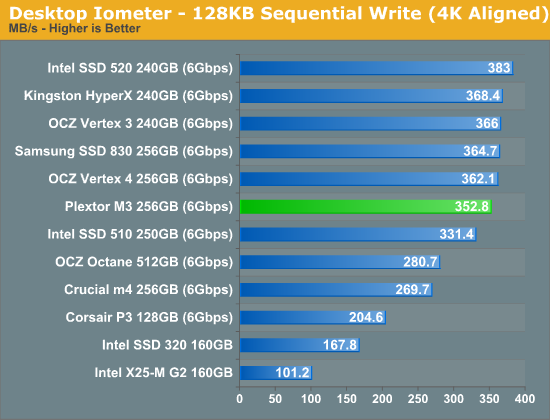
In sequential write speeds, the M3 is once again the fastest Marvell based SSD and is only a few percent behind SandForce based SSDs.










113 Comments
View All Comments
ImSpartacus - Thursday, April 5, 2012 - link
And you write pretty well considering your experience.This Guy - Thursday, April 5, 2012 - link
Agreed. You don't have a qurky style yet that screams out you wrote a piece, but this is a tech site so that's a good thing.You do a bloody good job, 18 or not. I haven't read many pieces by people as young that are at your level. You come off as a pro.
andylawcc - Thursday, April 5, 2012 - link
what "ImSpartacus" and "This Guy" said, good job Kristian!Sabresiberian - Saturday, April 7, 2012 - link
I agree, Kristian is doing a very nice job.I say all the time maturity and age aren't necessarily related, and Kristian is one more example of what I'm talking about.
The saddest thing about our society (in America and the rest of the "First World") is that the level of maturity has gone down, even though the actually average age in years has gone up. I quit a World of Warcraft guild a while back because of the lack of maturity - in the 30-something and older crowd, not the teenagers.
;)
Arbie - Friday, April 6, 2012 - link
And in what we can assume is a second language... I'm very impressed. Good job.Hourglasss - Thursday, April 5, 2012 - link
I'm 17, How do I get your job?JonnyDough - Friday, April 13, 2012 - link
As if that matters. Let me know when you start thinking in terms of decades instead of months. :)A5 - Thursday, April 5, 2012 - link
Man I'm old.ImSpartacus - Thursday, April 5, 2012 - link
O_oFuckin dream job for a minor, amirite?
earthrace57 - Sunday, April 8, 2012 - link
Wow...I am 14 and I would kill for that job :PBut in all seriousness, I would never have known that you were 18, you should go tell whoever taught you to write that they did a good job.